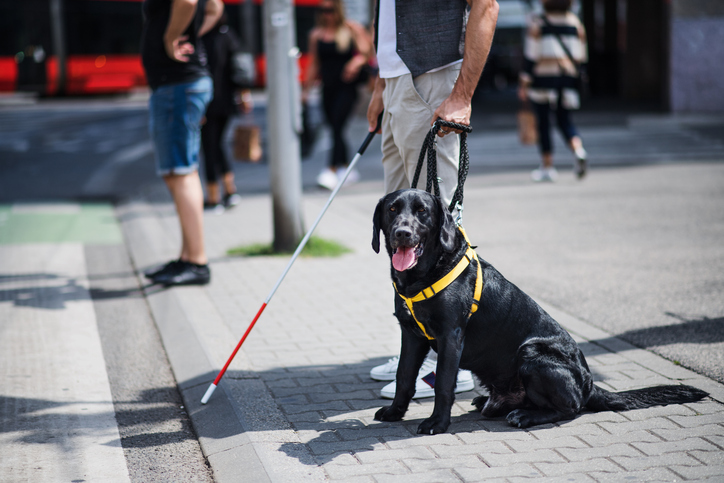WHAT ARE MY RIGHTS WITH SERVICE ANIMALS?
Disabled persons are entitled to have their service animals accompany them to all areas of a public accommodation “where members of the public, program participants, clients, customers, patrons, or invitees…are allowed to go.” (28 CFR §36.302(c)(7)).
Generally, this means that anywhere you are allowed to go, so is your service animal!
WHAT QUALIFIES AS A SERVICE ANIMAL?
A service animal is a dog (other species of animals are no longer permitted) that is individually trained to do work or perform tasks for the benefit of an individual with a disability. (28 CFR §36.104). This includes physical, sensory, psychiatric, intellectual, or other mental disabilities.
The work or tasks performed by the service animal must be directly related to the individual’s disability. Examples of work or tasks may include, but are not limited to:
- Assisting individuals who are blind or have low vision with navigation;
- Alerting individuals who are deaf or hard of hearing of the presence of sounds;
- Assisting individuals with poor mobility in pulling a wheelchair;
- Alerting individuals of the presence of allergens;
- Providing physical support and assistance with balance stability;
- Helping individuals with psychiatric or neurological disabilities by preventing impulsive or destructive behaviors.

WHAT QUESTIONS CAN A PUBLIC ACCOMMODATION ASK ABOUT MY SERVICE ANIMAL??
A public accommodation may only ask two questions concerning a service animal. (28 CFR §36.302(c)(6)). A public accommodation may ask:
- If the service animal is required because of a disability;
- What work or task the animal has been trained to perform.
A public accommodation may not ask about the nature or extent of a person’s disability. A public accommodation may not ask for any proof or documentation that the service animal has been certified, trained, or licensed.
In addition, generally, a public accommodation may not ask any questions when it is readily apparent that the animal has been trained to do work or perform tasks for an individual with a disability.
CAN A PUBLIC ACCOMMODATION DENY A SERVICE ANIMAL?
A public accommodation is not required to allow service animals if “…doing so would result in a fundamental alteration of jeopardize the safe operation of the public accommodation.” (ADA Title III Technical Assistance Manual, III-4.2300).
However, satisfying this legal exception is extremely difficult. Public accommodations will often frivolously, or in bad faith, claim that a service animal is not allowed for some false reason. However, their reasons rarely, if ever, hold up in court.
Feeling overwhelmed? Not yet ready to call? The links below will help answer some of your questions. Feel free to gain more information and feel more comfortable.
CLICK BELOW FOR ANSWERS TO COMMON QUESTIONS:
The links below provide detailed information to commonly asked questions. Click below:
You are already reading this as you desire more information, but why browse endless web pages looking for answers? Get the answers now. Call 866-790-2242 now for your free consultation.
(c)Malakauskas Law, APC. Attorney Advertisement. This website shall not be construed as legal advice and is for informational purposes only. Each and every case is different and requires an attorney to examine the specific case in question to arrive at an adequate legal conclusion. Consult with your own personal attorney for more information on the subject matters.